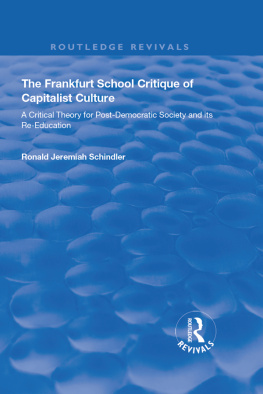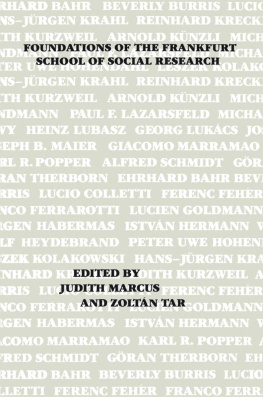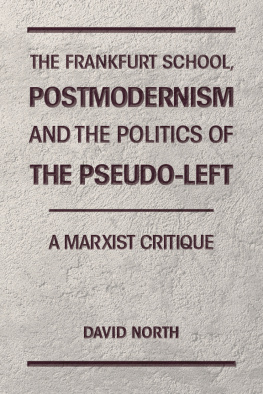What people are saying about
The Memeing of Mark Fisher
Watson is fast becoming one of the most impressive left analysts of our strange digital era; helping to fill the void left by Mark Fishers tragic passing. In his new book part tribute to Fisher, part cultural analysis, part reflections on the Frankfurt school Watson shows the enduring power of a dialectical approach to capitalist realism and exposes the many ways post-modern neoliberal culture has successfully neutered liberating aesthetics. In the powerful final chapter, Watson rethinks the potential of Frankfurt school critical theory to provide answers, and sketches an inspiring vision of what the acid-left can be. We may not have all the answers, but all of us should be very grateful Watson is on hand to help us ask the right kinds of questions.
Matt McManus, Professor of Politics at Whitman College
In the wake of Trump, the pandemic, as well as notable social democratic electoral losses in the West, Mike Watson is doing something that is much needed; hes asking the right questions. The meme wars have indeed coincided with a perilous fog of confusion and tension among those invested in emancipatory politics, but Watsons analysis of such trends is a luminous source of clarity.
David Stockdale, Nightmare Masterclass podcaster and YouTuber
The continued relevance of Mark Fishers work is strong evidence of the period of Capitalist Realism we still find ourselves stuck in. Mike Watson builds on this important tradition by directly addressing the memeosphere and social media discourse. Perhaps the emergent doomerism of online youth subcultures contains within it a glimmer of hope for an alternative future beyond neoliberalism.
Joshua Citarella, Artist, Researcher, Twitch Streamer
Watsons fantastic intervention takes on the depressive inertia of a post-covid, data driven society and asks how an important history of philosophy can argue us out of the impasses of contemporary social and political life. Working with a tradition from Benjamin and Marcuse to the late Mark Fisher, Watson shows that a particular form of economic and political theory needs to be combined with his own brand of media studies and pop culture analysis to bolster the causes of the digital Left today. Assessing the defeats of socialist causes over recent years and analysing the digital world of elections and desire, Watson rebuilds a class solidarity from an important history of Marxist theory that can re-invigorate the Left today in the battle against right-wing populism and capitalist media discourse. This ambitious book, taking in everything from conspiracy and memes to economic policy and election campaigns, is a must-read for anyone who wants to join the battle for a better future.
Alfie Bown, Royal Holloway, University of London
The Memeing of Mark Fisher
How the Frankfurt School Foresaw Capitalist Realism and What To Do About It
Also by the Author
Can the Left Learn to Meme?, Zero Books,
ISBN: 978-1-78535-723-7
Towards a Conceptual Militancy, Zero Books,
ISBN: 978-1-78099-231-0
The Memeing of Mark Fisher
How the Frankfurt School Foresaw Capitalist Realism and What To Do About It
Mike Watson
Winchester, UK
Washington, USA
First published by Zero Books, 2022
Zero Books is an imprint of John Hunt Publishing Ltd., No. 3 East St., Alresford,
Hampshire SO24 9EE, UK
www.johnhuntpublishing.com
www.zero-books.net
For distributor details and how to order please visit the Ordering section on our website.
Text copyright: Mike Watson 2021
ISBN: 978 1 78904 933 6
978 1 78904 934 3 (ebook)
Library of Congress Control Number: 2021935522
All rights reserved. Except for brief quotations in critical articles or reviews, no part of this book may be reproduced in any manner without prior written permission from the publishers.
The rights of Mike Watson as author have been asserted in accordance with the Copyright,
Designs and Patents Act 1988.
A CIP catalogue record for this book is available from the British Library.
UK: Printed and bound by CPI Group (UK) Ltd, Croydon, CR0 4YY
Printed in North America by CPI GPS partners
We operate a distinctive and ethical publishing philosophy in all areas of our business, from our global network of authors to production and worldwide distribution.
Contents
Guide
Spring 2020 to 2021 was the year that did not take place. We witnessed a depression, not economically speaking, but in the psychological sense: a clinical depression of and by society itself.
As sequential covid lockdowns conspired to cancel the majority of public events, consequently disrupting employment for millions of people worldwide, the social and economic sphere entered into a kind of catatonia. Suddenly, all but the wealthiest people found themselves in the position of the working- and under- classes: going nowhere, doing nothing, and with no forecast date of release from these prison-like conditions. At the time of writing, there is no way to know when this will end, although optimistic forecasts indicate that vaccines will soon allow us to return to some level of normalcy. Though this is little consolation for those who already lived in a kind of catatonic state prior to lockdown, without agency to act, work, socialize, or engage in hobbies. All theyll get to see is other people released from catatonia leaving them behind once again.
Above all, the Covid-19 virus suspended not just space, as it restricted movement to a small zone between ones house and the nearest supermarket. It restricted time as well, leading each day to be a copy of the last. For many people respite only came from the bizarre covid dreams which came about not as a result of any exposure to the virus, but from hyperactivity of the subconscious during sleep, due to a lack of stimulus in the waking hours (which had curiously migrated to the night time). Its as if the endless space-time of the irrational sleeping brain was given the task of making up for the restrictions imposed on time and space, not only by lockdown but also by the data economy. In the world of home-working, everything becomes a unit of time that can be broken down into likes, views, follows, etc. Even Zoom conference calls become reducible to efficient and non-efficient facial gestures, productive and counterproductive tones of voice. When the call is finished and one goes to the bathroom the mind wanders, asking how would this play to the audience/clientele? Will it ultimately deliver the right audience response, the right data, the desired profit?
Making sense of all this will take years, decades even. As we scrabble about, trying to fathom the world as we emerge from the shock of covid (if not from covid itself), it is natural perhaps that we look backward, to the theories that have helped explain our societies up to this point. In doing this, it is natural to look to another point of collapse and cultural re-emergence that of the post-war period and in particular the work of the Frankfurt School, the informal name for theorists associated with the independent Institute for Social Research, based in Frankfurt, and founded in 1923. That is, anyhow, my point of departure and the basis of this book, which aims to situate the online culture of the late 2010s to 2020s, both shortly before and during covid, within the framework of the thought of Theodor Adorno, Walter Benjamin, Max Horkheimer, and Herbert Marcuse the main figures of the Frankfurt School. This is in part as each one of these related yet idiosyncratic thinkers understood the horror of World War Two as somehow linked to the historical process of reification (the making into an object) of social and cultural relations in line with the tendency of capitalism to subjugate nature and humanity to the numerical count (and therefore to profit). Each saw this as a result of the project of the Enlightenment gone awry and suggested remedies by way of, respectively: artistic abstraction (Adorno); the association of constellations of objects and occurrences with which to interpret capitalism (Benjamin); a return to philosophizing (Horkheimer), and a freeing of eros via artistic expression (Marcuse).













